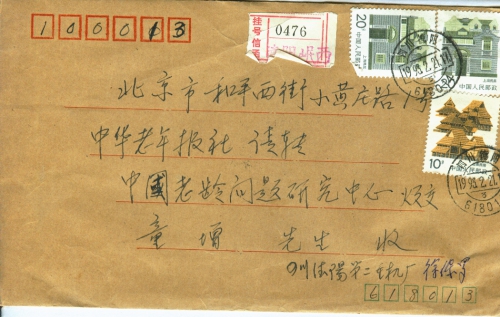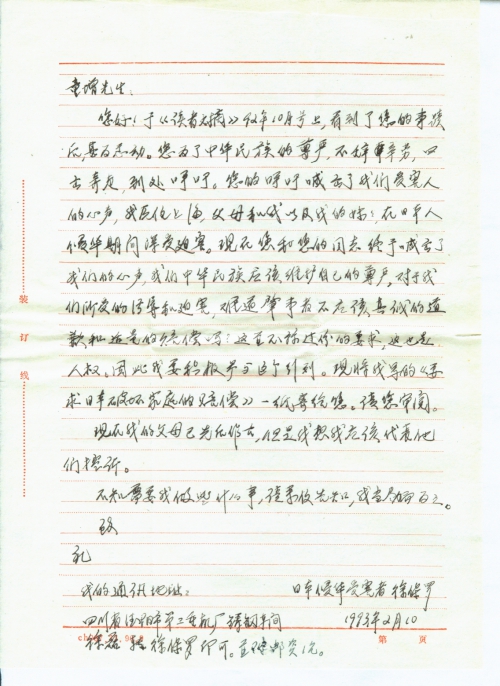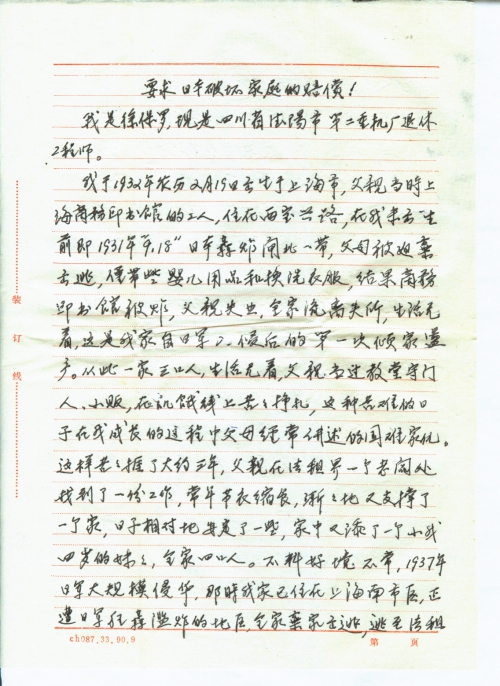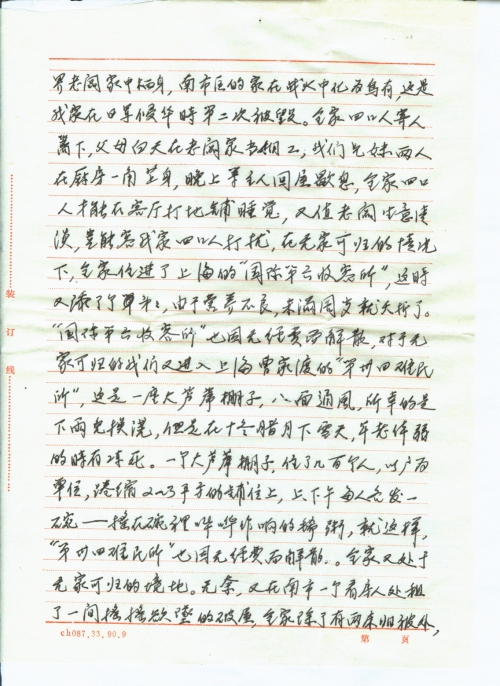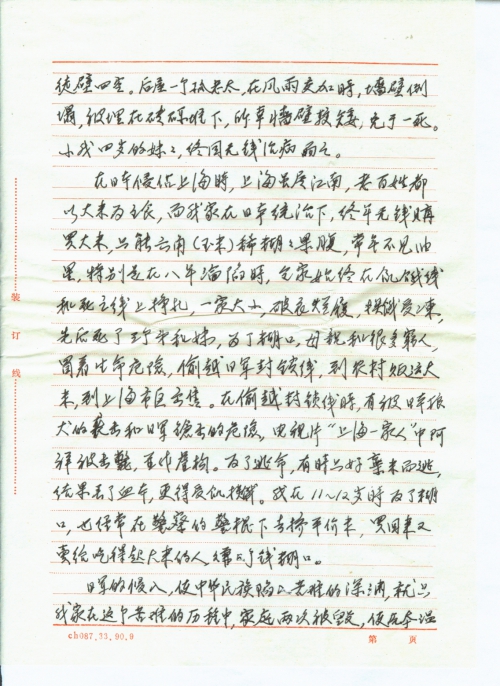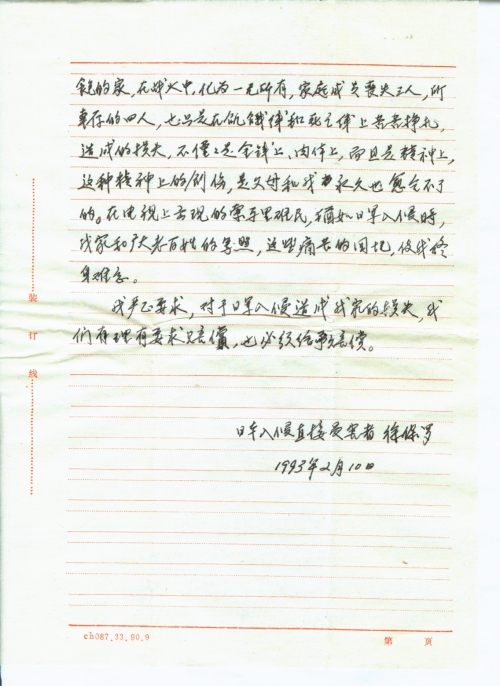Date of letter:1993-02-10
Address of author:Deyang County, Sichuan Province
Date of event:1931, 1937
Location of event:Shanghai City
Name of author:Xu Baoluo
Name(s) of victim(s):Xu Baoluo
Type of atrocity:Air Bombings (AB)
Other details:In 1931 the Japanese bombed Shanghai and made my whole family homeless. In 1937, my family suffered again from another bombing launched by them. For that I claim compensation from Japan.
Mr. Tong Zeng:
How have you been?
I am very touched by your acts reported in Reader’s Digest of October 92. You’ve so worked hard for the dignity of Chinese people. You’ve spoken out what’s in the mind of victims like me. I originally lived in Shanghai, with my parent and my sister and suffered tremendously during the Japanese invasion. You and your team finally give our voice and our heart an opportunity to be heard. Chinese people’s dignity must be protected and respected. Shouldn’t the criminals make a sincere apology and proper compensation for the insult and torture we’d suffered? This should not an excessive request, but part of human rights. Therefore, I decide to actively participate in the program and the team. Now I am sending you my article Demanding Compensation Against Japan for Destroying My Family for your review.
My parents have passed away, but I suppose I should file a claim on behalf of them.
I don’t know what I need to do. Please tell me in the reply letter and I will try my best to do it.
Best regards,
Victim of Japan’s war of aggression against China
Xu Baoluo
February 10, 1993
My Mailing address: Steel Workshop, Second Heavy Machinery Factory of Deyang, Sichuan
Xu Baoluo in care of Xu Lei. Postage of 1 Yuan is attached.
Demanding Compensation Against Japan for Breaking My Family Apart
I am Xu Baoluo, a retired engineer from Second Heavy Machinery Factory of Deyang, Sichuan.
I was born in Shanghai on lunar calendar of February 19, 1932. My father was then a worker of Shanghai Commercial Press and lived on West Xibaoxing Road. On September 18, 1931 shortly before I was born, Japan bombed Zhabei, so my parents were forced to flee, and abandoned almost all their belongings except some baby stuff and clothes with them. Shortly, the worse happened. The Shanghai Commercial Press was bombed, so my father lost his job and my family lost the sources of income and became homeless. After that, my father worked as a church doorman and vendor. We struggled on the brink of starvation. My parents repeatedly told me about the nation and family’s tremendous pain and suffering, humiliation and loss and hardship while I grew up. After living like this for about 3 years, my father got a job from a boss at the French Concession. Gradually, my father could support us to live a frugal life again. After our life was stabilized, my family had a new member-a sister, 4 years younger than me. However, the good days didn’t last long. In 1937, the Japanese army launched a comprehensive invasion against China. At that time, we lived in Nanshi, Shanghai, an area heavily bombed by the Japanese army. So we were forced to leave our home and flee to my father’s boss’s home at the French Concession. Our home in Nanshi was completely destroyed in the fire of war second time by the invading Japanese army. So, 4 of our family members had to live under others’ roof. In the daytime, my parents worked as servants for their boss and my younger sister and I stayed in a corner of the kitchen. At night only after my father’s boss went back to his room and rested, can we sleep in the living-room. But the boss’s business was bad and could not afford the help from us long. So we moved in the 6th International Shelter in Shanghai. Then, our family had a new younger brother, who unluckily died before he turned 1 year old due to insufficient nutrition. After a period, the 6th International shelter was shut down due to a lack of funds. Still homeless, we had to move in the 34th Refugee Camp in Caojiadu, Shanghai. It was a large hut with wind coming in from all sides. Well, at least, it could shelter us from rain. It happened very often that some of the elderly and weak people would be frozen to death in cold winter. The hut housed several hundreds of people divided by household. Each household lived on a berth of 2-3 square meters. Each person would be given a bowl of porridge in the morning and afternoon. But after a period, even the 34th Refugee Camp had to close due to a lack of funds. Our family became homeless again. We had no choice but rent a broken hut in Nanshi from a doorman. The only assets we had were 2 quilts. There was an old woman living in the house behind ours. She was buried among bricks in a storm night when the wall collapsed, but survived only because the wall was not very tall. Later, my younger sister got sick and eventually died because we had no money to get her any treatment.
Shanghai is located in the south of the Yangtze River where the people live mainly on rice for meal. But when Japan occupied Shanghai, we had no money to buy rice throughout the year; we could only afford corn, let alone meat. Especially during the 8-year Sino-Japanese war, the whole family always struggled on the brink of starvation and death. Adults or children, we all wore worn clothes and shoes and suffered from starvation and cold. I had 3 siblings died of this hardship. To try to feed us, my mother and many other poor people secretly passed the Japanese block line to the countryside and try to smuggle rice into the urban area of Shanghai at the risk of their life from Japanese military dogs and gunshots. In the TV series A Family in Shanghai, Axiang was shot to death because of that. It is not fictional. Sometimes, people had to leave the rice behind and run for their life and then suffer from greater loss of the money and deeper hunger. When I was 11 or 12, I often squeezed in the crowd despite the police baton to buy the cheap price and then try to sell it to the people who could afford to pay extra money to earn some income for the family.
The Japan’s invasion of China made the Chinese people’s life a tremendous misery. Take my family alone as an example, our house was destroyed twice and we lost everything in the fire of war. The war took the life of 3 of my family members and left the remaining 4 struggled on the brink of starvation and death. It traumatized us physically and mentally with great material losses. My parents and I suffered permanent mental trauma through our life. What the Somali refugees go through on the TV screen are exactly what my family and other Chinese families went through when the Japanese army invaded China. I can never forget these painful memories in my life.
I seriously and officially demand compensation for my family’s losses caused by the Japanese army during their invasion to China. We believe we have sufficient ground to request compensation and we must be compensated.
Direct victim of Japan’s war of aggression against China
Xu Baoluo
February 10, 1993














